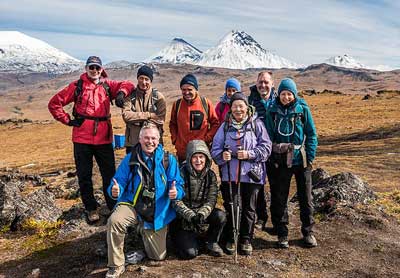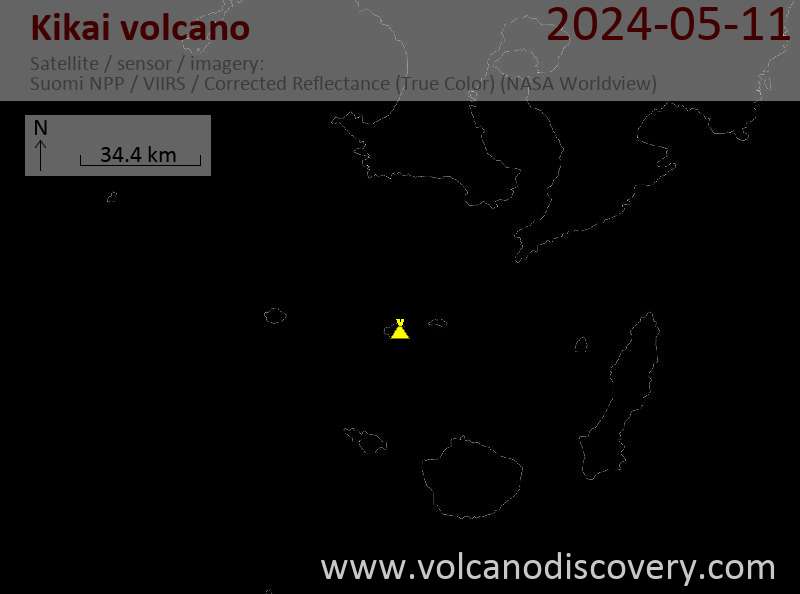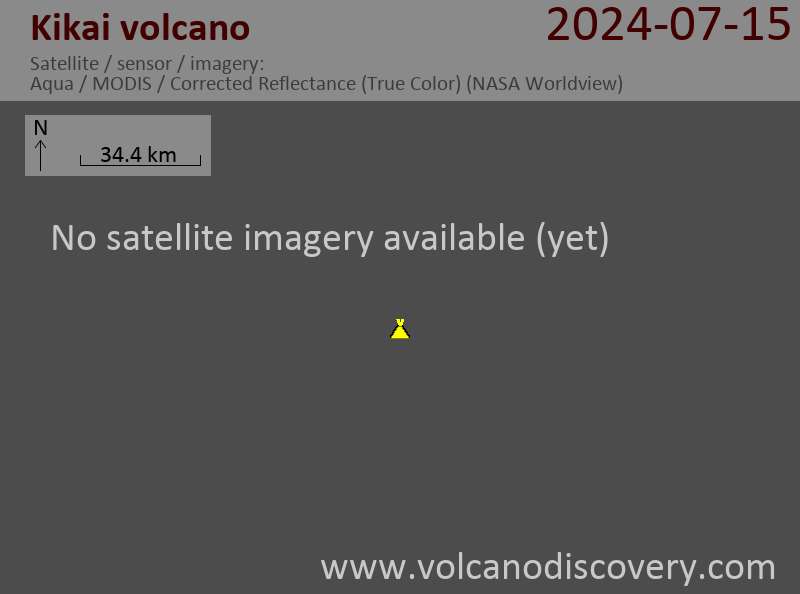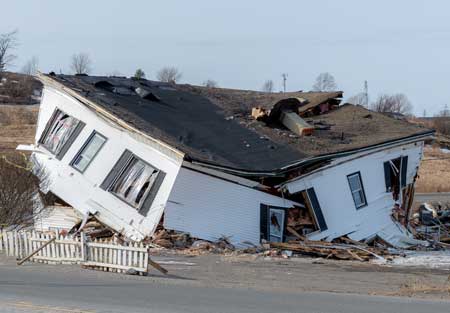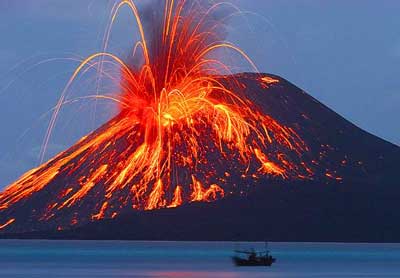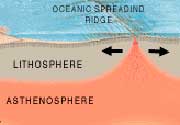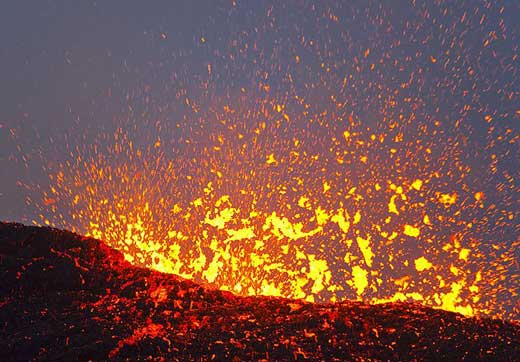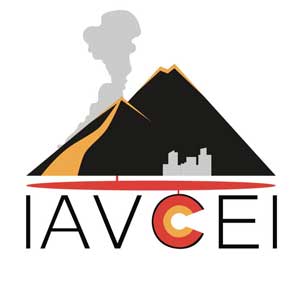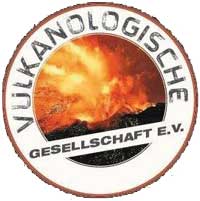Kikai Volcano
Updated: Apr 20, 2024 00:00 GMT -
caldera 704 m / 2,310 ft
Ryukyu Islands (Japan), 30.79°N / 130.31°E
Current status: restless (2 out of 5)
Ryukyu Islands (Japan), 30.79°N / 130.31°E
Current status: restless (2 out of 5)
Last update: 2 Aug 2023 (Smithsonian / USGS Weekly Volcanic Activity Report)
Kikai volcano is a 19 km large, mostly submerged caldera at the northern end of the Ryukyu Islands of Japan, located 45 km south of Kuyshu. It is one of the country's most active and most explosive volcanoes.
Satsuma-Iojima (or Tokara Iojima), a portion of the mostly submerged NW caldera rim, is a small 6x3 km wide and 681 m high island, which has about 140 inhabitants. Its name meaning "sulphur island", it has been the site of most historic eruptions of the caldera, mostly from the Iwo-dake lava dome.
[smaller] [larger]
Kikai volcano eruptions: 2020, 2019, 2013, 2004, 2003, 2002, 2000-01, 2000, 1998-99, 1997, 1988, 1934-35, 1914 (?)
radiocarbon / tephrochronology dated: 1430 ± 75 years, 1340 ± 30, 1030 ± 40, 1010 ± 40, 750 AD (?), 390 AD ± 100, 280 BC ± 75, 1090 BC ± 100, 1830 BC ± 75, 2450 BC ± 1000, 3250 BC ± 75, 3250 BC ± 75
around 4350 BC: VEI 7 caldera-forming eruption, one of the largest on earth in 10,000 years, producing the Akahoya tephra
Latest nearby earthquakes
| Time | Mag. / Depth | Distance / Location | |||
| Apr 16, 11:08 am (GMT +9) | 2.6 141 km | 24 km (15 mi) to the N | Info | ||
| Sunday, April 14, 2024 GMT (1 quake) | |||||
| Apr 15, 03:09 am (GMT +9) | 2.5 124 km | 20 km (12 mi) to the NE | Info | ||
Background
About 6300 years ago, Kikai volcano produced one of the largest known eruptions in the world during the past 10,000 years. The eruption devastated southern and central Kyushu and left the present-day caldera.Younger cones have grown inside the caldera, including Iwo-dake, a rhyolitic lava dome at the eastern end of Tokara-Iwo-jima. Kikai's frequent historical activity were small to medium explosive eruptions mainly from Iwo-dake.
Showa-Iwo-jima is a lava dome (also known as Iwo-jima-Shinto) that forms a small island 2 km east of Tokara-Iwo-jima. It formed during submarine eruptions in 1934 and 1935.
Eruptions of Kikai volcano
2004 ash eruptions
Ash clouds with plume heights ranging from 1.2-1.5 km were produced by small explosions from Iwo-dake between March - September 2004.
Ash clouds with plume heights ranging from 1.2-1.5 km were produced by small explosions from Iwo-dake between March - September 2004.
2000-2003 activity: small ash eruptions
Phases of weak intermittent explosive activity occurred between Oct 2000-Dec 2001, 24 May-5 June 2002, and again 7 June - 22 September 2003.
The height of ash plumes never exceeded 2-3 km and the eruption caused no damage, only minor ash fall in nearby areas.
Phases of weak intermittent explosive activity occurred between Oct 2000-Dec 2001, 24 May-5 June 2002, and again 7 June - 22 September 2003.
The height of ash plumes never exceeded 2-3 km and the eruption caused no damage, only minor ash fall in nearby areas.
1998-99 eruptions
Small explosive activity occurred at Iwo-dake some time between late-April and early-May 1998. A 5 cm ash deposit was observed by Japanese geologists at the crater of Iwo-dake lava dome.
Residents of Tokara-Iwo-Jima saw ash eruptions in August and October 1998.
Small explosive activity occurred at Iwo-dake some time between late-April and early-May 1998. A 5 cm ash deposit was observed by Japanese geologists at the crater of Iwo-dake lava dome.
Residents of Tokara-Iwo-Jima saw ash eruptions in August and October 1998.
1988 eruptions
Following a quiet of 333 year, the first activity since 1935 occurred on 18 January 1988 and consisted in small phreatic explosions ejecting ash to 400-500 m above the summit crater of Iwo-dake.
Residents did not feel any seismic activity preceding the eruption. A high-temperature fumaraole at the summit was measured 788°C, more or less unchanged since the last survey in 1985.
Source: GVP monthly reports
Following a quiet of 333 year, the first activity since 1935 occurred on 18 January 1988 and consisted in small phreatic explosions ejecting ash to 400-500 m above the summit crater of Iwo-dake.
Residents did not feel any seismic activity preceding the eruption. A high-temperature fumaraole at the summit was measured 788°C, more or less unchanged since the last survey in 1985.
Source: GVP monthly reports
1934-35 submarine island forming eruption
A submarine eruption occurred 2 km east of Tokara-Iwo-Jima between 17 September 1934 and 20 September 1935.
The eruption started from vents at a water depth of 200-300 m. "Smoke" and floating pumice were seen in September 1934 and detonations could be heard. By November, a new island started to appear, but was destroyed by explosions on 30 December 1934.
A second island formed in January 1935, reaching 300 m length, 150 width and a height of 20 m when measured on 20 January. It had a crater of 50 m diameter and a viscous lava flow was observed on the western side. A 3rd, smaller island was born on 20 February. Its activity was surtseyan, frequent phreatomagmatic eruptions at intervals of less than a few minutes, building up a pyroclastic cone. When observed on 26 March, it was 22-23 m high. The other island had entered a magmatic phase and a lava dome had appeared reaching 50-60 m height.
---
Sources:
- Peter Hedervari (1986) "CATALOG OF SUBMARINE VOLCANOES AND HYDROLOGICAL PHENOMENA ASSOCIATED WITH VOLCANIC EVENTS", World Data Center A for Solid Earth Geophysics, Report SE-42, Georgiana Observatory, Budapest
- Kano, K. (2003) "Subaqueous Pumice Eruptions and Their Products: A Review", in White et al (eds.) "Explosive Subaqueous Volcanism", American Geophysical Union monograph 140, pp 231-244
A submarine eruption occurred 2 km east of Tokara-Iwo-Jima between 17 September 1934 and 20 September 1935.
The eruption started from vents at a water depth of 200-300 m. "Smoke" and floating pumice were seen in September 1934 and detonations could be heard. By November, a new island started to appear, but was destroyed by explosions on 30 December 1934.
A second island formed in January 1935, reaching 300 m length, 150 width and a height of 20 m when measured on 20 January. It had a crater of 50 m diameter and a viscous lava flow was observed on the western side. A 3rd, smaller island was born on 20 February. Its activity was surtseyan, frequent phreatomagmatic eruptions at intervals of less than a few minutes, building up a pyroclastic cone. When observed on 26 March, it was 22-23 m high. The other island had entered a magmatic phase and a lava dome had appeared reaching 50-60 m height.
---
Sources:
- Peter Hedervari (1986) "CATALOG OF SUBMARINE VOLCANOES AND HYDROLOGICAL PHENOMENA ASSOCIATED WITH VOLCANIC EVENTS", World Data Center A for Solid Earth Geophysics, Report SE-42, Georgiana Observatory, Budapest
- Kano, K. (2003) "Subaqueous Pumice Eruptions and Their Products: A Review", in White et al (eds.) "Explosive Subaqueous Volcanism", American Geophysical Union monograph 140, pp 231-244
The Akahoya eruption of Kikai around 4350 BC
This ultra-plinian eruption of Kikai around 4350 BC was one of the largest Holocene eruptions on the planet. It ejected about 150 cubic kilometers of rhyolithic magma, i.e. 3 times more than the largest historic eruption, the 1815 Tambora eruption!
The eruption produced massive rhyolithic pyroclastic flows that traveled across the sea for 100 km and reached southern Kyushu. Ash layers from this eruption are found all over Japan until the northernmost island Hokkaido and form an important geologic marker.
The eruption devastated southern and central Kyushu, which afterwards remained uninhabited for several centuries. The present-day caldera resulted at least partly from collapse after the eruption. ...more info
This ultra-plinian eruption of Kikai around 4350 BC was one of the largest Holocene eruptions on the planet. It ejected about 150 cubic kilometers of rhyolithic magma, i.e. 3 times more than the largest historic eruption, the 1815 Tambora eruption!
The eruption produced massive rhyolithic pyroclastic flows that traveled across the sea for 100 km and reached southern Kyushu. Ash layers from this eruption are found all over Japan until the northernmost island Hokkaido and form an important geologic marker.
The eruption devastated southern and central Kyushu, which afterwards remained uninhabited for several centuries. The present-day caldera resulted at least partly from collapse after the eruption. ...more info




